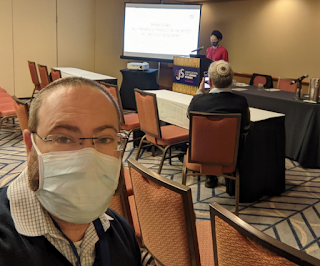2021 was my biggest year of podcasting yet. This was likely due to the pandemic.
Granted, 2020 was a big year for podcasting, in general, and for me also, especially since 2020 marked the first full year of running my own podcast, which I had begun in the fall of 2019. What I think marks 2021 differently than 2020 is also appearing on more podcasts others published. The most numerous of these are my appearance on a podcast about the Marvel Cinematic Universe (MCU), although I appeared on others, as well.
Of the 48 podcast appearances on which I appeared in 2021, 31 of these were for my own podcast, The Jewish Drinking Show. While this was fewer than the 44 episodes I published in 2020, if one combines all of my appearances on podcasts, it still felt like more than 2020.
 |
| In 2021, I appeared ten times on an MCU podcast |
Having mentioned my ten appearances on an MCU podcast, it was largely driven by all of the new Marvel shows that are that have been coming out in Disney Plus, which has been really exciting and has really driven my fandom this year, vastly far surpassing my interest in Star Wars. My interest in Star Wars in recent years has been waning, in general, and certainly in comparison to the MCU. Although I did appear on a few Star Wars podcasts, it wasn't at the same level.
 |
| I appeared a couple of times on Let There be Light |
In the Jewish realm, I appeared on the American Israelite's podcast a couple of times in-studio as a sort of rabbi-in-residence for the podcast, Let There be Light. I also appeared on a couple of other podcasts, primarily to promote The Jewish Drinking Show.
One other thing that also upped my podcasting game this year was getting a proper microphone for such endeavors. I was able to get this after someone had gifted me an Amazon gift card for a video-editing project that I did and I very much appreciated that token of their appreciation, which was just enough to get a Blue yeti microphone, which definitely elevated my audio quality for podcasting, whether appearing as a guest or for hosting.
Here is a listing of my podcast appearances in 2021:
Star Wars Podcasting:
- Discussing the First Releases of the High Republic Books on Skywalking Through Neverland
- Discussing “The Bad Batch” Episode 6 on the What A Piece of Junk! Podcast
- Discussing Star Wars Clone Wars on the “Who’s the Bossk?” Podcast
MCU Podcasting:
- True Believers #4: Discussing WandaVision ep. 5 and trailer for The Falcon and The Winter Soldier
- True Believers #12: Discussing The Falcon and The Winter Soldier ep. 5 and the Shang-Chi and the Legend of the Ten Rings teaser trailer
- True Believers #14: Discussing “Marvel Studios Celebrates The Movies”
- True Believers #17: Discussing Loki ep. 1
- True Believers #22: Discussing Black Widow
- True Believers #23: Discussing the season 1 finale of Loki
- True Believers #29: Discussing episode 5 of What If?
- True Believers #33: Discussing the season 1 finale of What If?
- True Believers #34: Revisiting Captain America: The First Avenger
- True Believers #35: Revisiting Captain Marvel
Jewish Podcasting:
- Drinking & Drashing episode 17
- Bridging Connections episode 23
- Let There Be Light season 2 episode 2
- Let There Be Light season 2 episode 20
The Jewish Drinking Show (in reverse chronological order):
- Homa’s Day in Court (Ketubot 65a) with Noam Sachs Zion
- Taverns in the Talmud (בי כובי) with Prof. Laura Lieber
- Rabbi Moshe Isserles’ Censored Responsum on Gentile Wine with Prof. Marc Shapiro
- Medieval Rabbis on Gentile Wine with Prof. David Freidenreich
- Kiddush in Kabbalah with Prof. Rabbi Joel Hecker
- Kosher Cocktails Enthusiasts Facebook Group with Dovid Statman
- Cocktails in Mochers Magazine with Yissie Steinhart
- Pandemic-Pivoting in Israel with Joel Haber
- Pandemic Liquor Sales (NJ) with Mendy Mark
- The Jews and Booze Facebook Group with Josh Mann
- The Kamtza And Bar Kamtza Episode with Rabbi Noah Ferro
- The Ammonite Wine Midrash with Rabbi Reuven Chaim Klein
- Pre-Pandemic Liquor Sales with Mendy Mark
- Psalm 104:15 in the Babylonian Talmud with Professor AJ Berkovitz
- The Wine Festival In The Dead Sea Scrolls with Professor Marvin Sweeney
- Gentile Libation Wine (יין נסך) In The Mishnah And Tosefta with Professor Avram Shannon
- Maharal of Prague on Jewish & Gentile Wine with Rabbi Michael Bernstein
- Drinking and Drashing: Another Jewish Drinking Podcast with Amanda Weiss and Gabe Snyder
- Wine At Bris Milah with Rabbi Hayim Leiter
- Yeshiva High School Students Binge-Drinking with Dr. Rivka Press-Schwartz
- Maimonides on Kiddush and Havdallah with Rabbi Dan Margulies
- Distilleries Selling Their Hametz with Rabbi Chaim Litvin
- The Origin of the Dropping of Wine At The Passover Seder with Rabbi Dr. Zev Farber
- Women And The Four Cups Of Wine At The Passover Seder with Miriam Gedwiser
- Why Four Cups in Rabbinic Literature? with Rabbi David Polsky
- Medieval Jewish Legal Authorities (Rishonim) on Purim-Drunkenness with Rabbi David Fried
- Drinking Parties In The Book Of Esther with Professor Joshua Joel Spoelstra
- An Early Kabbalistic Approach To Purim-Drinking with Professor Vadim Putzu
- Wine in the Book of Ben Sira with Professor Michael Satlow
- Angels and Asparagus: Discussing a Curious Talmudic Beverage with Professor Mika Ahuvia
- Praying Under the Influence (& Providing Halakhic Guidance) with Rabbi David Polsky



